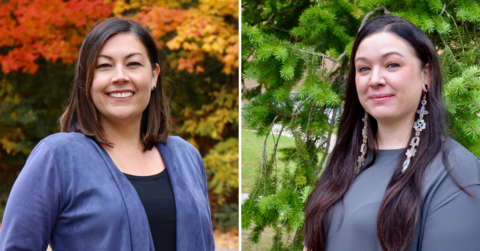
Two Canada Research Chairs announced in the Tri-U!
Canada Research Chair (CRC) in Indigenous Histories and Historical Practice in Canada
“I want to foster a new generation of scholars interested in supporting Indigenous community histories, while at the same time changing the ways Canadians think about the history of these lands now known as Canada," says Wilfrid Laurier University associate professor Dr. Lianne C. Leddy in the award announcement.
Dr. Leddy plans to build a historical research hub to support community-driven projects. By training graduate students and postdoctoral fellows in responsible, ethical historical research, her team can develop research projects that arise at the request of Indigenous communities in alignment with their priorities.
Another key research priority is to re-examine the experiences of Indigenous women and their relationships to settler forces in the Great Lakes watershed during the late 18th and early 19th centuries. Dr. Leddy will focus on the later fur trade period, when Indigenous peoples still held the balance of power and colonial relationships were taking shape, a topic explored by settler historians but few Indigenous scholars.
“My research uses an Indigenous feminist lens to bridge Indigenous histories and methodologies with traditional western historical approaches,” says Dr. Leddy. “I am prioritizing Indigenous voices and stories.”
Dr. Leddy is an Anishinaabekwe member of Serpent River First Nation. She was also a recent recipient of the 2023 Governor General's History Award for Scholarly Research.
I am delighted that this CRC provides me with an opportunity to recruit more graduate students to Laurier as part of the Tri-University program.
Canada Research Chair (CRC) in Tentewatenikonhra'khánion (We Will Put Our Minds Together)
“My goal is to make knowledge our ancestors shared with museum and archival staff in the past easily accessible to current and future generations of Hodinohso:ni People,” says Dr. Talena Atfield.
The goal of this CRC program is to contextualize and make accessible, a collection of archival, linguistic, photographic, and material culture collected by F.W. Waugh between 1900 and 1924. Community-led interviews, artist engagement, cultural workshops and sharing circles will promote the regeneration and reintegration of historical information contained in these collections that has been inaccessible to most of the community for over 100 years.
This project aims to Indigenize collections by prioritizing community narratives that bring the past into dialogue with the present and the future. Most importantly, this CRC will facilitate the interpretation, development, and sharing of information using Hodinohso:ni knowledge systems in ways that respect and honour Hodinohso:ni traditions and protocols, while decentering colonial authoritative narratives.
Dr. Talena Atfield is of Kanien'kehá:ka of the Grand River and mixed settler backgrounds.
The award was originally announced by the University of Waterloo in March.
My goal is to make knowledge our ancestors shared with museum and archival staff in the past easily accessible to current and future generations of Hodinohso:ni People
The Canada Research Chairs Program (CRCP) stands at the centre of a national strategy to make Canada one of the world's top countries in research and development....
Chairholders aim to achieve research excellence in engineering and the natural sciences, health sciences, humanities, and social sciences. They improve our depth of knowledge and quality of life, strengthen Canada's international competitiveness, and help train the next generation of highly skilled people through student supervision, teaching, and the coordination of other researchers' work.